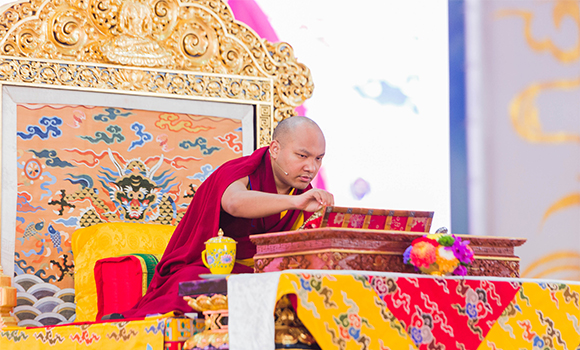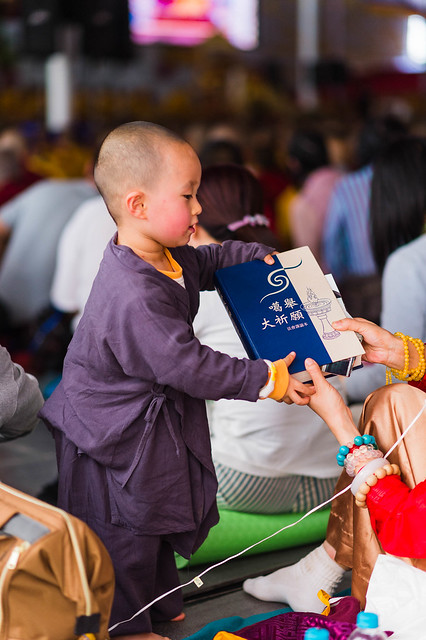
10 February 2017 – Monlam Pavilion, Bodhgaya
The Karmapa began the afternoon session by reading from the remaining text of the Guru Yoga section of the Torch of True Meaning:
“There are four factors for devotion to become the path….if you see the guru as having faults, the impurity of your own mind stream is to blame. How could Buddhas have any faults? Let them do what they will, even should you see them having sexual relations, telling lies and so on, meditate thinking: this is the best way to train disciples, because of this he will undoubtedly ripen and liberate many sentient beings. This is a hundred, a thousand times more marvelous than keeping a pure moral code….
In particular, when he reprimands you, think that this extinguishes bad karma; if he slaps you, think that he is driving away spirits and obstructors; above all, think that due to his compassion he has treated you as a father does a child and is not being a false friend. He is being very kind.
If he seems displeased and is not paying attention to you, think that this is because your karmic obscurations have not been purified. Strive at the methods to purify your obscurations and please the guru by serving his body, speech and mind. In brief, the first factor is not finding fault with the guru. Second….recognize that whatever he does is a positive quality. Third….resolve to stop expecting or worrying. Fourth….focus all your actions of body, speech, and mind on serving him.
For the training, everything is contained within two things: accomplish whatever the guru commands and do whatever he wishes….”
After he finished reading from the text, the Karmapa noted that this completes the instructions for Guru Yoga that are found in the Torch of True Meaning and that what follows are the instructions on the main practice. Actually the main practice is really taught in Mahamudra, the Ocean of Definitive Meaning, he said, and what is taught here is just a distillation or a synthesis of that, but it is not necessary to go over that now.
[In the Guru Yoga section] there were many things said about the topic of the lama—many things about how to meditate upon Guru Yoga. “But actually,” the Karmapa said, “there are different types of individuals with varying capacities, and in particular there are those people who are appropriate vessels for practicing the Secret Mantra Vajrayana. Such people should be able to practice according to all the special instructions that are given in the text. But it is difficult for everyone to be able to do exactly as is written in this text and I do not think it is even necessary to do that,” the Karmapa added. “And this is an important point to understand.”
“In particular there are four points for taking devotion as the path,” he elaborated,
- Do not think of the guru’s faults.
There is a difference between what is taught in the texts and reality. If we examine the situation carefully, no one is wholly positive or negative: everyone has a mixture of faults and qualities. So it is hard find the perfect guru. It is not like we can take the text in our hands and go looking for the perfect guru, comparing him with the text, ticking off qualities: he has got this one, he has got that one. We cannot do that.
We can even see this in worldly situations when we are looking for a partner: we want someone who has all positive qualities and no faults. People say to me, “I have trouble finding a partner,” and that is because they have such high hopes. Some people set their criteria so high that the only person who could possibly meet those criteria would be themselves and so they must stay alone, living with themselves. If that were the case, it would be very strange. Thus, if we want the qualities then we also must accept the faults.
It is also important to understand the purpose and reasons for serving the guru. For example, when bees collect pollen from flowers, they know exactly what their task is and they do it perfectly. In this example, the guru is like the flower and the captivating qualities of the guru’s mind are like the pollen that must be retrieved. Moreover, when bees collect pollen from flowers, the colour of the flower is irrelevant, nor does it matter if the flower is beautiful or not. The most important thing is the pollen that they need to obtain. We need to think about this like a business enterprise. We need to extract what is profitable and leave the rest. We should become close to the spiritual master and cultivate a mutual connection with them. So that is the first point and that is looking at it from a negative point of view.
- Think that everything the guru does is positive.
The second point is from a positive point of view: we should see everything the guru does as a quality and as an opportunity to train our minds. I think this is the basic meaning. So no matter what the connection between the guru and disciple, do not let it go to waste. See everything that happens as a way to train the mind and improve oneself. Look for the opportunity to do that.
Basically, the trust between the guru and disciple should be indestructible; it should be stable and lasting, and something to have true confidence in. Even in society, when a man and woman really love each other, their connection cannot be harmed or destroyed by any other circumstance. It is like a vajra rock.
- Resolve to stop expecting or worrying.
We should not have expectations, nor hope to get something out of our relationship with the guru as if it were a business deal. We should recognize that our own devotion is our responsibility–a task that we must undertake ourselves. It should not be the case that if the lama treats us in one way we will have devotion and if he treats us in another, we will not.
When we have devotion for the guru, it is not just for a single lifetime, but life after life and birth after birth, and we should release ourselves from the binds of hope and fear.
- Always have a pure and admiring attitude.
The fourth is that we should always have a pure, admiring, and loving attitude towards the guru. We need to do whatever our guru demands and accomplish whatever he wishes. There is nothing that is not included in these two.
Primarily the relationship between the guru and disciple is a dharmic one. If the guru tells you to do something worldly and you do not do it, it is probably okay. But if he teaches you something dharmic and you actually practice it, then this reinforces the connection between the guru and disciple. It is important to actually practice the dharma that the guru teaches.
The relationship with the guru should span many lifetimes, but if we do not do any of the dharma practices, then it will be difficult to follow him from life to life.
“So that completes that,” the Karmapa said, and he went on to give the reading transmission for the Four–Session Guru Yoga.



